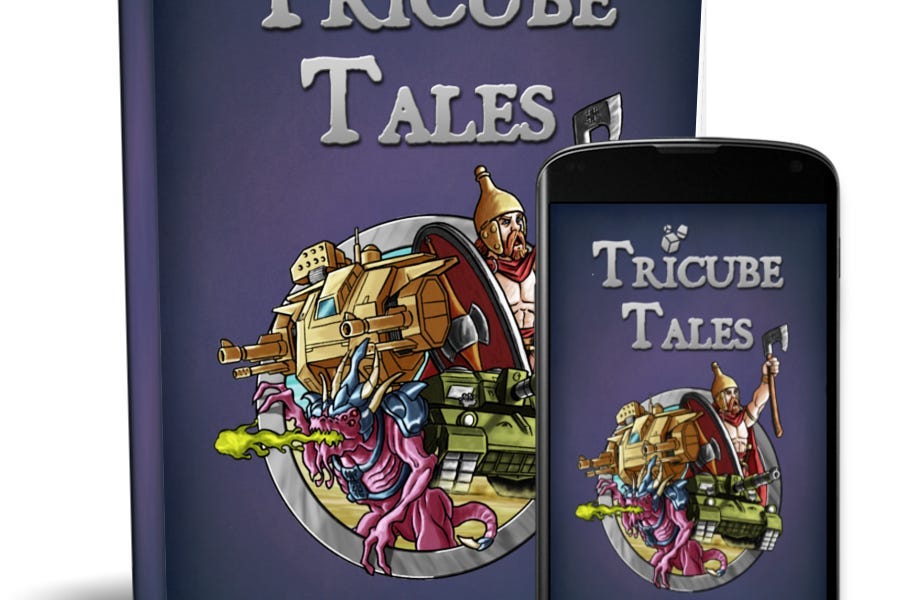My Top 3 Rules-Lite RPGS for 2024
Beyond offering remarkable creativity and value, each of these titles can have groups or solo gamers up and running in minutes.
Last year’s top 3 was:
#3: EZD6
#2: Tiny Dungeon 2e
#1: Tricube Tales
After outlining my new rating system for this year’s top three games, here are the results:
#3: Cairn - 1st edition (Yochai Gal)
“Cairn is an adventure game about exploring a dark & mysterious Wood filled with strange folk, hidden treasure, and unspeakable monstrosities. Character generation is quick and random, classless, and relies on fictional advancement rather than through XP or level mechanics. It is based on Knave by Ben Milton and Into The Odd by Chris McDowall. The game was written by Yochai Gal.” (www.cairnrpg.com)
Accessibility: 10/10. A phenomenal game for newcomers and those transitioning from D&D to something more compact that retains an “old school” vibe. When I run Cairn, I can explain the rules and have players roll up characters ready for adventure within 20 minutes.
Flexibility: 5/10. You could play Cairn in a non-fantasy setting, but its core design is meant to facilitate a fantasy experience within a dark, mysterious wood. And it excels at that. That being said, porting the core mechanics to another setting wouldn’t take much effort, but would require some work and digging for additional resources and supports.
Player Empowerment 8/10. Cairn uses the “you are what you have” approach to character building, meaning characters are defined by their items and inventory. This is incredibly fun and allows the focus and specialty of each player’s character to shift over time without negative consequences. Cairn’s lack of “feats” or class-specific powers may be a drawback to some, but special powers and “feats” can be accessed through relics (i.e. magic items). Overall, Cairn allows players to craft an enormous breadth of unique characters from classic fantasy tropes to the wildly unconventional.
Game Master Support: 8/10. Cairn’s core rules provide some excellent, bullet-list GM (i.e. “Warden”) Principles. But Cairn’s core rulebook does not hold your hand when it comes to GMing. Aspiring Wardens will likely need to bring some GMing experience to their first session, and/or seek guidance and support online through the Cairn Discord group and www.cairrpg.com. Note: Cairn 2e will include a Warden’s Guide which I anticipate will bump this score up to a 10/10.
Solo Support: 5/10. There are no solo supports in the core rules. While Barrow Delver provides a basic framework for solo gamers, dedicated soloists will need to heavily augment Cairn with 3rd party solo materials. But it’s rules-lite nature allows Cairn to be soloed enjoyably with some tailored supports.
Long-Term Play: 6/10. Cairn, like most rules-lite rpgs, relies on in-game rewards and advancement more than crunchier systems offering boosts and bonuses through leveling up. Cairn’s scar system is a very interesting mechanic that makes character growth unpredictable, and might even incentivize long-term play. That being said, the absence of a traditional leveling system with progression paths chosen by players may be an unattractive feature for some that causes them to avoid committing to an extended campaign.
Cost: 10/10. It’s free. It shouldn’t be, but Cairn is free. Author Yochai Gal’s generosity is remarkable, and the number of no-cost, high-quality resources available through cairnrpg.com and itch.io collections makes this a game you can get into for practically nothing.
Art and Layout: 6/10. Cairn’s rulebook is well-organized and concise. The layout is easily readable and the B&W art is evocative. That being said, there’s very little art in the first-edition rulebook. Granted, quality art is expensive, so its scarcity in a free game is more than understandable. Note: Cairn 2e looks like it’s going to be a HUGE improvement in this area!
Distinctive Features 10/10: The following features serve to distinguish Cairn from its rules-lite cohort.
A d20 roll-under system built around three ability scores: Strength, Dexterity, and Willpower.
No “roll to hit” in combat. Damage only. Combat is war, not sport.
Scar mechanic makes character progression unpredictable and exciting.
An efficient and consequential inventory system that sidesteps tedious inventory management.
Kick-ass character sheets.
Community Engagement: 10/10. Yochai Gal has cultivated a welcoming and active community of players who are continuing to add to the Cairn ecosystem. Cairn’s discord is a tremendous resource, and people seem eager to support both players and GMs. Nothing but good things to say on this front.
Overall Score: 78/100
#2: Tricube Tales (by Richard Woolcock)
“Tricube Tales is a generic, rules-lite, open-license tabletop roleplaying system that is designed to be fast and portable, making it ideal for pick-up games. It requires little preparation or bookkeeping, and the main PDF can be comfortably read on a smartphone screen.” (from Drivethrurpg.com)
Accessibility: 10/10. Due to its simplicity, Tricube Tales may be the best onramp into rules-lite gaming. It’s a sharp, fun, minimalist system. But don’t let its simple mechanics fool you. This is a great game for experienced groups looking to shed the deadweight of crunchier systems and want a system that allows them to effortlessly jump into exciting, unforgettable adventures.
Flexibility: 10/10. Tricube is designed to be setting agnostic. It runs smoothly and intuitively whether your game setting is dark fantasy, sci-fi, horror, modern, or even mystery. Because Tricube can flex into any genre with ease it should be a serious contender for any group looking to run a rules-lite game/campaign.
Player Empowerment 7/10. By building an Archetype and assigning free-form Perks and Quirks, the possibilities for character creation are practically limitless. Tricube’s mechanical minimalism may feel limiting to some, but with some thought given to one’s Archetype, Perks, and Quirks, players can create some very specific and creative characters. That being said, there are only so many levers to adjust in such a minimalist system, so while character customization can cover a large breadth, the depth of mechanical options is limited.
Game Master Support: 10/10. Not only do the original rules provide good examples and basic instructions on how to run a game, the new Micro Edition provides an incredibly helpful paint-by-number adventure generator that will be especially useful for inexperienced GMs.
Solo Support: 10/10. For a small fee, Tricube Tales has an entire suite of resources for the solo gamer. And they are excellent. I have purchased the solo rules and cards, and they are high quality and beautifully constructed. Tricube Tales pairs perfectly with solo play due to its simplicity and player-facing rolls. It’s a fantastic system to cut your soloing teeth on.
Long-Term Play: 7/10. Tricube Tales is ideal for one-shots. But what about multi-session campaigns? Tricube’s advancement rules allow you to add Perks, Quirks, Karma, and Resolve points to characters as they progress. With some creativity, I’ve found these advancement options allow for meaningful character advancement well beyond one-shots. However, the minimalism of the system may create challenges beyond 5-7 advancements. Players wanting lots of "level-ups” will likely be frustrated by the lack of mechanically distinct advancement options. But Tricube Tales is designed to be a story-driven game, and creative groups and players need not be limited by the minimalism of the system.
Cost: 10/10. Tricube Tales is free. And so is every official Tricube one-page setting by Richard Woolcock (and most 3rd party one-page settings). Richard Woolcock’s generosity is remarkable given the fact that charging even a small amount for the rulebook and one-page settings would be completely justified. You don’t even need a set of polyhedral dice to play. Three die 6’s and you’re good to go.
Art and Layout: 10/10. A big part of what makes reading and re-reading Tricube Tales pleasurable is its inspiring illustrations and aesthetically pleasing interior design. From the cover design by Luigi Castellani, to the interior artwork by Rick Hershey and Storn Cook, Richard Woolcock has created a product with a level of professionalism and polish unparalleled for a free rules-lite roleplaying game.
Distinctive Features 8/10. The following features serve to distinguish Tricube Tales from its rules-lite cohort.
Perks and Quirks are free-form, providing broad character customization.
Arguably the best rules-lite/minimalist system to onramp newcomers of any age into the hobby.
Excellent solo rules and supports.
A diverse, creative, and ever-expanding number of quality (often free!) one-page settings ranging from Heroes of Sherwood Forest, to Conniving Cat Burglars (a game where you play as roguish cats who commit larceny!).
Community Engagement: 5/10. The online Tricube Tales community is dedicated, but quite small. My experience with the community has been very positive, and Richard is in near-constant communication on the Tricube Discord. But the online presence of those devoted to Tricube Tales is less than this great game deserves.
Overall Score: 87/100
#1: 2400 and 24XX (Jason Tocci)
“2400 is a plug-and-play toolkit. It’s not just one RPG, but a series of self-contained modules, easy to slot in or ignore entirely. Each one is 3 pages plus a cover, fitting on two sides of a letter-sized sheet of paper.” (https://jasontocci.itch.io/2400)
Accessibility: 9/10. It’s so rules-lite that if you squint, the 24XX suit of games could be classified as FKR. That level of minimalism can be intimidating for new players and GMs. But if an experienced GM is taking the lead, 2400 is fast and furious fun. The core rules can be explained in minutes and character creation is incredibly simple and intuitive. This system competes with Tricube Tales for my preferred game to use to onboard newcomers into the hobby. However, the name leaves a lot to be desired in terms of marketing. I think the obtuse monicker hinders the game’s ability to be found and promoted by players, which is a shame.
Flexibility: 10/10 As evidenced by the 24XX collection over at itch.io, the 2400 system has been adapted into an enormous amount of bespoke settings and genres. It’s a brilliantly easy system to hack and there are a ton of supports for would-be game authors to use.
Player Empowerment: 10/10. 2400’s dice chain mechanic for skills and talents (i.e. “feats”) allows players enormous mechanical flexibility to create customized characters. Regardless of what genre or world I was playing, I never felt limited when it came to character creation.
Game Master Support: 8/10. While written with extreme brevity in mind, many 24XX games offer GM principles with examples of play. Jason Tocci’s Emergency Rules and devblog are also a great source of GM support.
Solo Support: 7/10. 24XX games offer no official support for solo play, but they are imminently solo-able. In fact they are my preferred games when I’m running a solo session or campaign. I’m not sure why, but this system feels like the ideal marriage of minimalism with some focused mechanical crunch that sings as a solo experience. But 3rd party solo supports will be required.
Versatility: 10/10. While ideal for one-shots or micro-campaigns, 24XX’s dice chain skill progression system and customizable talents ensure players wanting to participate in longer campaigns have all they need to watch their characters grow in power and uniqueness.
Cost: 8/10. 2400 and most 24XX games are not free, but they offer enormous value for the money. For example, my favorite fantasy iteration of these games - 1400 Lo-Fi Hi-Fantasy - is not free, but it’s a steal of a deal. For $10 I’ve enjoyed coutless hours of immersive role-playing adventure!

Art and Layout: 10/10. Minimalism is the name of the game when it comes to most 2400/24XX products. Beyond a cover page featuring evocative art, illustrations are non-existent. But the layouts are sharp and thoughtfully organized. The content density spread across three pages is astounding. 2400/24XX games are a true case study in efficient, compact design.
Distinctive Features: 9/10
Incredibly newbie-friendly.
Player-facing dice rolls with degrees of success.
Dice-chain advancement mechanic is fun and intuitive (higher skill = higher dice).
Each game acts as a stand-alone setting or toolkit that can be integrated into other 1400/24XX games. ,
Rules, character options, GM tables and adventure hooks are masterfully organized across three efficiently designed pages.
Imminently solo-able.
Community Engagement: 8/10.
Beyond the ever-expanding itch.io collection of 2400/24XX games, the 24XX Discord channel is lively and helpful.
Overall: 89/100
There you have it! Agree? Disagree? Share your thoughts below! Most importantly, be sure to check out each of these awesome games! You won’t be dissappointed!










I'm inclined to agree, it adds a lot of "pressure" to the system, if that makes sense, just stuff that DM and players need to know. Also pretty much impossible to use the rules with my 5yo.
Do you think that the introduction of Tricube Tactics affects your rating at all? I've found that it has been easy to dip into Tactics as the players became more comfortable and hungry for combat crunch.